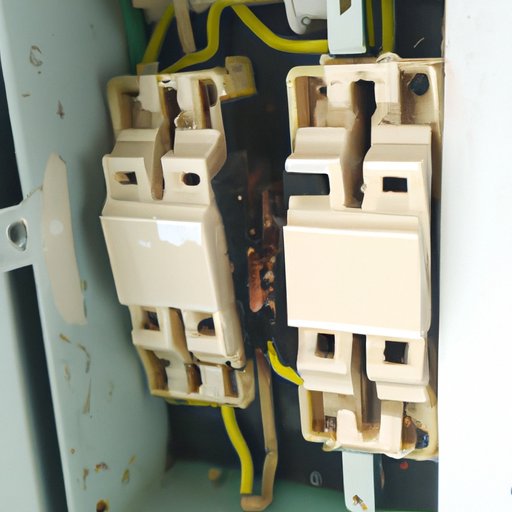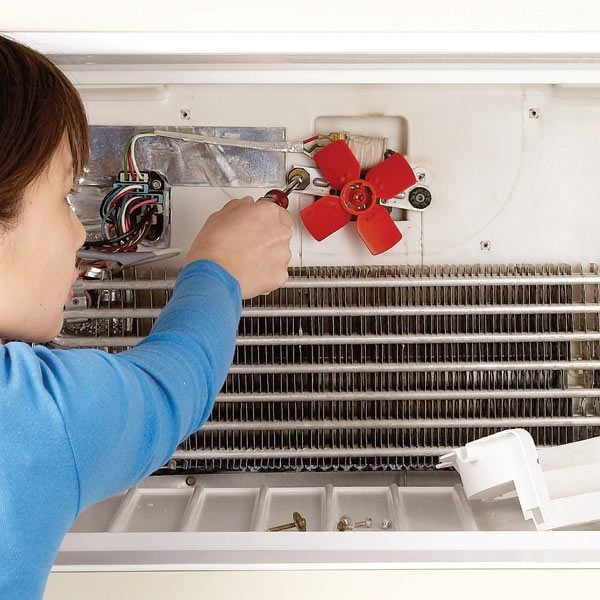Introduction:
A refrigerator is a vital appliance in any household, preserving the freshness of our food and beverages. However, when it trips the breaker, it can be a major inconvenience, leading to spoiled food and disruption of daily routines. Understanding the underlying causes and implementing effective solutions to this issue is crucial.

Image: www.tffn.net
Common Causes of Refrigerator Tripping Circuit Breaker:
-
Overloaded Circuit:
When multiple high-wattage appliances or devices are connected to the same circuit as the refrigerator, the combined electrical draw can exceed the circuit’s capacity, causing it to trip.
-
Compressor Problems:
The compressor is the heart of the refrigeration system, responsible for circulating refrigerant and removing heat from the refrigerator compartment. A malfunctioning compressor can draw excessive current, leading to breaker trips.
-
Image: www.familyhandyman.comDamaged or Faulty Wiring:
Wires within the refrigerator or its power cord can become damaged or frayed over time, increasing electrical resistance and generating heat, which can trip the breaker.
-
Defective Overload Relay:
An overload relay is a safety device designed to protect the compressor from overworking. A faulty relay can fail to disconnect the compressor when necessary, resulting in breaker trips.
-
Refrigerant Leaks:
Refrigerant leaks can reduce the efficiency of the refrigeration system, causing the compressor to work harder and potentially trip the breaker.
Troubleshooting Steps:
-
Inspect Connected Appliances:
Unplug any additional appliances or devices connected to the same circuit as the refrigerator to reduce the electrical load.
-
Check Compressor:
Listen for any unusual noises or vibrations coming from the compressor. A faulty compressor may produce rattling or humming sounds.
-
Examine Wiring:
Visually inspect the wiring within the refrigerator and its power cord for any signs of damage or fraying. Damaged wires should be repaired or replaced by a qualified electrician.
-
Test Overload Relay:
Using a multimeter, test the continuity of the overload relay. A faulty relay will show an open circuit, indicating the need for replacement.
-
Check for Refrigerant Leaks:
Look for any oily residue or discoloration around the evaporator coils or condenser coils. These can be signs of refrigerant leaks, requiring professional attention.
Recommended Solutions:
-
Reduce Circuit Load:
Redistribute appliances and devices to different circuits to avoid overloading the circuit connected to the refrigerator.
-
Replace Compressor:
If the compressor is determined to be faulty, it will need to be replaced by an authorized technician.
-
Repair or Replace Wiring:
Damaged or faulty wiring should be repaired or replaced promptly by a qualified electrician to ensure electrical safety.
-
Replace Overload Relay:
A defective overload relay should be replaced with a new one to prevent the compressor from overworking and tripping the breaker.
-
Seal Refrigerant Leaks:
Refrigerant leaks require professional attention. Contact an authorized refrigeration technician to locate and seal the leak, restore the system’s efficiency, and prevent further breaker trips.
How To Fix Refrigerator Tripping Breaker
Conclusion:
Understanding the causes and solutions for a refrigerator tripping the breaker empowers homeowners to take proactive measures to maintain the functionality of this essential appliance. By carefully troubleshooting, addressing underlying issues, and implementing the recommended solutions outlined in this guide, you can restore your refrigerator to optimal operation and prevent future interruptions.








